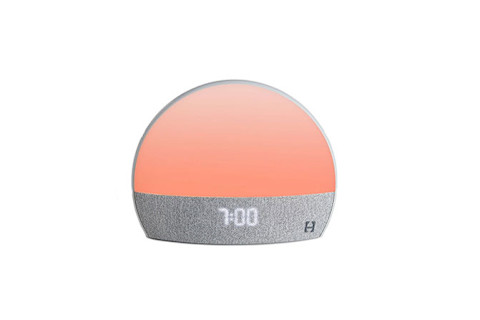
When it comes to alarm clocks, most people have a "set it and forget it" approach. Once we make the decision to wake up to the sound of a song, a faraway jungle, or a blaring bell, we stick to it—day after day. But when's the last time you considered whether your alarm clock is actually working for you, or whether it's time to switch things up? Consider this your wake-up call: It might be time for a new one.
Why having the right alarm clock is important.
Consistently waking up at the same time promotes steady energy levels during the day and easier sleep at night. That's why sleep specialists recommend setting a realistic bedtime and wake-up time that you can stick to religiously—even on the weekends.
"The consistency of your sleep schedule is actually what gives you energy," Michael Breus, Ph.D., a clinical psychologist, once explained on an episode of the mindbodygreen podcast. According to the board-certified sleep specialist, if you can find a wake-up time that matches your body's inherent sleep pattern (also known as your sleep chronotype), "you will have far more energy and—believe it or not—need less sleep."
Over time, your body should get used to waking up at this time and do so naturally—no ocean waves or "Here Comes the Sun" chorus needed. But if you're not quite there yet, alarm clocks can help keep you on track. They do have a downfall, however, and that's the snooze button.
Comforting as those nine extra minutes of shut-eye may be, they don't allow enough time for you to actually slip into the deeper stages of sleep, where real repair and restoration can occur. And by repetitively jolting you out of your slumber, snoozing can also cause you to feel even groggier when you finally do get out of bed.
"Nobody wins," holistic psychiatrist Ellen Vora, M.D., previously told mbg of the downfalls of snoozing. "You're not getting great rest, and you're also not having a leisurely, relaxed morning."
An effective alarm clock, then, will wake you up at a consistent time—without making you want to reach for the snooze button.
What the experts use.
To find the best alarm for you, you'll need to consider your personal sleep habits. If you always press the snooze button, an old-fashioned clock that doesn't have one might be for you. If you often sleep through your alarm, an extra-loud clock designed for heavy sleepers could be the ticket.
As for what experts use on their own nightstands, alarm clocks that gradually get brighter to simulate the sunrise are becoming increasingly popular. It makes sense that these are beloved by sleep specialists, given that there's real science backing them up. Exposing yourself to bright light first thing in the morning—and throughout your entire day—has been shown to help keep your circadian rhythm on track (and, by extension, keep your sleep-wake cycle more consistent).
Nishi Bhopal, M.D., a psychiatrist specializing in sleep medicine, says that the Philips light she uses helps her wake up feeling more alert. "It just kind of eases you into a state of wakefulness," she tells mbg. "It's much less jarring than an old-fashioned alarm clock, or even an alarm on your phone."
If you've ever heard of people using sun lamps to adjust to seasonal changes in light, these alarms work similarly. By mimicking the light of the sun in the morning, they send a clear signal to the body that it's time to wake up and get going. "Early morning exposure to bright light stimulates photoreceptors in our retinas, shutting down melatonin levels and allowing cortisol to rise," immunologist Heather Moday, M.D., previously explained to mbg. "It also increases the production of serotonin—one of our feel-good hormones."
Heavy sleepers and those who wear eye masks to bed can program these clocks to emit noises as well. But Bhopal is a fan of just using the light feature to gently support her circadian rhythm and provide that ever-important sleep-wake regulation.
The bottom line.
Waking up at the same time every morning is a great way to start your day on the right note. Alarm clocks are a tool that can help you do so, but they're certainly not the only one. An energized morning starts with a great night's rest, so don't forget to prioritize a calming bedtime routine, nightly stress management tools, and a sleep-promoting supplement if needed.*




